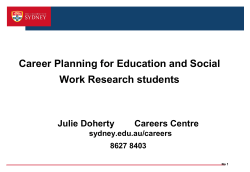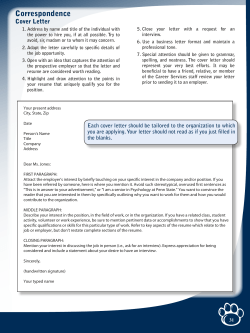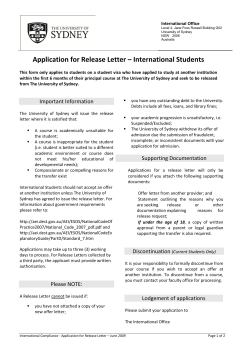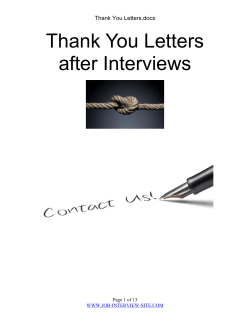
Be Job Ready Academic Learning Support
Academic Learning Support Be Job Ready Acknowledgements Department of Education, Employment & Workplace Relations NSW Department of Education & Training www.seek.com.au Australian Taxation Office O32014 Page 1 Our Mission Statement: “To support students in complementing their academic endeavours with career enhancement strategies and work experience opportunities that will contribute to their personal, professional and intellectual development”. We will provide you with the following assistance: Individual assessments Career coaching & planning Workshops/information seminars Job application assistance Opportunities to acquire work experience Involvement in community projects/volunteer positions Information regarding part-time, casual, and graduate employment 2 Internet Resources Popular Job Search Sites: www.seek.com.au www.seekcampus.com.au www.careerone.com.au www.mycareer.com.au www.jobsearch.gov.au www.jobsjobsjobs.com.au www.parttimeworkforce.com.au www.graduatecareers.com.au www.parttimeonline.com.au Sites to Assist Job Search Skills: www.career2.com www.gradsonline.com.au www.careersonline.com.au Casual Retail Job Sites: Coles Group: www.career.colesgroup.com.au/ Woolworths: www.wowcareers.com.au/wowcareers/woolworths/home/ Myer: www.myer.com.au/careers/ Bunnings Hardware: www.bunnings.com.au/contact-us _join-our-team.aspx K-Mart: www.kmart.com.au/careers/default.asp Target: www.target.com.au/html/careers/careers.htm 3 Interpreting Job Selection Criteria The job selection criteria outlined below (see Handout 1) is typical of the criteria requiring your response in your job application. Not every job advertisement includes this type of job selection criteria, however if included you will be required to respond to the criteria as part of your overall application. When responding to the criteria, ensure you: Include your responses after your cover letter Respond to each criterion individually, and in the same order as outlined in the job advertisement. Take each criterion as a heading and write 1 or 2 paragraphs to explain how you meet the requirements Try and include the same language and wording used in the criteria Use your experiences (work and academic) to describe how you meet the criteria Provide genuine work and academic examples Where possible include the result and an indicator of success Consider the key selection criteria outlined below. How would you respond using your work and academic experience? Essential Criteria 1) Relevant basic accounting skills or studying towards an accounting qualification _________________________________________________________________________________ 2) Experience in data entry, preferably accounts payable and general accounts _________________________________________________________________________________ 3) Basic understanding of accounting principles and reconciliation requirements _________________________________________________________________________________ 4) Willingness to work in a team environment _________________________________________________________________________________ 5) Sound communication skills and attention to detail _________________________________________________________________________________ 6) Intermediate computer skills including Excel and word _________________________________________________________________________________ Desirable Criteria Basic Accounting qualification 4 Cover Letter Writing Mr Paul Brown Office Manager Best Products Pty Ltd 20 Bridge Road Sydney NSW 2000 15th January 2013 Make a strong start to your letter Dear Mr Brown, Describe your Experience in relation to the job I possess a strong background in the field of Accounting and Administration combined with previous work experience at Walkers and Associates as an Assistant Accountant. Why should they hire YOU? Target to the job Thank you & ending Your letter I wish to apply for the position of Accounting Assistant as currently advertised through seek.com.au. In this role, I was responsible for reporting to my Accounts Manager, and assisting in the preparation of overall accounting for clients using the ‘MYOB’ program. I gained extensive experience in managing accounts on a client by client basis using accounting software and continually liaising with the clients. My Accounting and Administration skills gained through my academic studies combined with my recent Accounting experience are particularly relevant to this position. Furthermore, my excellent communication skills, client service capabilities, and willingness to succeed would be beneficial to meet both client and business needs. Please find enclosed a copy of my resume for your consideration. I would be more than willing to provide any supporting material or information required to further my application. I look forward to meeting with you in the near future to discuss my suitability to the role. Thank you for considering my application. Yours sincerely, Ravinder Singh Your mobile number Sign your letter if sending by post – otherwise leave blank More cover letter samples can be found online http://content.mycareer.com.au/advice-research/coverletter/sample-cold-call-cover-letter.asp 5 _______________________________________________________________________________ Stephanie Chen _________________________________________________ PERSONAL DETAILS: Address: 20 View Street, Marrickville NSW 2204 Mobile: 0411 111 555 E-mail: schen01@bigpond.com EDUCATION: Jul 2013 – Present Kent Institute of Business and Technology, Sydney Graduate Diploma of Management Jul 2010 – May 2012 University of New South Wales, Sydney Graduate Certificate in Human Resource Management Mar 2002 – Jun 2006 University of New England, Armidale Bachelor of Arts EMPLOYMENT HISTORY: Aug 2012 - Present QEC International Pty Ltd, Haymarket Sydney Marketing Assistant Data entry duties General administration Maintaining client database Jun 2010 - Present Woolworths Pty Ltd, Marrickville Sydney Customer Service Assistant Cash Handling & Balancing Customer Complaint Resolution Customer Enquiries 6 Nov 2009 - Dec 2009 Talent Creation Ltd. Shanghai, China Shipping Documentation Assistant Preparing shipping documentation Data entry processes Client information collection Jan 2008 - Feb 2008 China Shipping Logistics Co. Shanghai, China Administrative Assistant Data entry duties General administration tasks Documentation presentation VOLUNTEER WORK Jun 2012 – July 2012 World Vision Australia, Sydney Volunteer Office Assistant Mar 2011 – Jun 2011 Sydney City Mission, Sydney Volunteer Administration Assistant COMPUTER SKILLS MS Office Internet / Email Proficient in Microsoft Word, Excel, and PowerPoint Advanced practical skills LANGUAGE SKILLS Chinese (Mandarin): fluent REFEREES Available Upon Request 7 Job Interview Preparation The job interview is the most important part of getting a job. To make a good impression at the interview, it is important that you prepare yourself thoroughly. Preparing For Success A job interview can be a very daunting and nerve-racking experience! The best way to both survive the experience and make it a successful occasion is to be organised and prepared. Here are a few suggestions about how to prepare for interviews: Learn about the job and the company: What would you be doing? Know as much as you can about the job you are applying for and where the job role fits into the organisation. If there are selection criteria, these will give you a good idea of the work you would be undertaking. The job advertisement will also give you information. What do they do? Find out what the company makes sells or offers. The more you know and understand the products and services produced by the business, the better prepared you will be. Who are they? Find out about the employer, where the business is based, try telephoning the Marketing or Public Relations Unit for any information or try to obtain a copy of the company's annual report if it is publically available. You may know someone who works there or be able to get information from the Internet, the Yellow Pages, or your local library. Know what to take: It is important to take with you to the interview the following paperwork: Your resume A copy of your application, especially if you had to address any selection criteria. Qualifications, school records (if appropriate) and evidence of the levels completed. Any certificates or special awards relevant to the job. Written references if you have them (these maybe from your referees or others) Samples of your work or hobbies that may be related to the job. For example, a model, samples of typing, art portfolio materials, copy of a report you have written, etc. Your employment folder in which to present all this information. This is normally a vinyl folder with clear plastic pockets, which contains all of the above paperwork. Know how to get there: Double check the address of the business. 8 Make sure you know how to get to the building (use your street directory, GPS, or ‘Google Maps’). Check bus and train timetables (www.131500.com.au ) or parking and street directions so you know you will arrive on time (at least 10 minutes early). If in doubt, do a trial run - go to the company beforehand and time yourself getting there. Decide what to wear: Decide what you are going to wear and have it ready the night before. Be clean, neat and tidy. For example, brush your hair, have clean finger nails and clean shoes. Dress to suit the occasion. Avoid wearing "street" clothes, scruffy jeans or thongs. It is a better idea to dress ‘better’ for the job interview than what you would be wearing working in the job on a daily basis. If it looks like rain, ensure you take an umbrella. Remember, your presentation is not just about what you wear: How you speak Do you come across as confident or arrogant? Are you surly or too quiet and timid? Do you speak clearly or do you mumble? Most employers are looking for a person who speaks politely and confidently. If your first contact with an employer is via the telephone, the way you address them and the way you make your enquiry and carry on a conversation is absolutely critical. What you say Your choice of words is vital. Do not use words the employer may consider to be swearing. Answer questions clearly and honestly, and don't waffle on. It may help to practise what you want to say. Body Language What messages are you communicating by the way you stand, greet a person, and generally hold yourself? The outside of our body is like a window to the inside. Be prepared to shake the hand of the employer you are meeting and make it a firm, positive handshake. Cultural Sensitivities When you are dealing with most employers, it is important you look them in the eye and maintain eye contact while you talk with them. This shows confidence and respect. However, this is not always appropriate for all cultures. For example, bowing your head slightly while shaking hands will often be appropriate with employers of an Asian background. Just be aware of these sensitivities and they will be greatly appreciated as a mark of respect for that person. 9 Discussion Topics: Some major areas of non-verbal behaviours to explore are: Eye contact Facial expressions Gestures Posture and body orientation Paralinguistics Humour Eye Contact: Eye contact is an important channel of interpersonal communication that helps regulate the flow of communication Facial Expressions: Smiling is a powerful cue that transmits: Happiness Friendliness Warmth & Understanding Gestures: If you fail to gesture while speaking, you may be perceived as boring, stiff and unanimated. Head nods, or ahum... a form of gestures, communicate positive reinforcement to people and indicate that you are listening Posture and Body Orientation: We communicate numerous messages by the way we walk, talk, stand and sit. An active posture or a “not interested” posture. Which do you notice? Paralinguistics: This facet of non-verbal communication includes such vocal elements as: Tone Rhythm Loudness Inflection (pitch tone) Ensure you demonstrate a variety of tone in your voice – avoid using “monotone” responses Humour: Humour is often overlooked as an interview skill. It is often not encouraged in interviews. However, laughter (when appropriate) can release stress and tension for all parties and instil a “human” quality in the job candidate 10 The Job Interview & Beyond Know What to Say: Give brief, clear answers to questions (but not just "Yes" or "No"). Practise the answers to questions the employer may ask. Use the list below for ideas. Typical Questions Employers Ask: What aspects of the job interest you most? What do you consider your special skills and abilities are? What are your strengths and weaknesses? Have you had any work experience in this type of work? What do you know about our company? Are you active in any clubs or community organisations? What are your leisure activities/hobbies/interests? Which of your school subjects interested you the most? What are your long term career plans? Would you undertake further training if it was required for this position? How do you cope with new situations/procedures? How do you feel about working as part of a team? Would you be prepared to work overtime or on weekends if required? When could you start? They may ask you to discuss different situations: You are working as a receptionist at the front desk of an office. Your manager has asked you to arrange some appointments with staff as soon as possible. At the same time a client appears at the desk as the phone starts to ring. How do you cope with this situation? Describe a situation where you have had conflict with a co-worker or fellow student and explain how this conflict was resolved? Know What to Ask: Prepare some questions you will ask the employer. Ask job related questions, such as those listed below, not questions about holidays or money. It creates a good impression and lets the employer know you want to work for the company. Here are some questions you could ask: What would be my career prospects? What further study could I do? 11 Where and who would I be working with? What training would I be given? At the Interview...a few helpful tips to calm the nerves! The actual interview itself can be a very scary thing to face, especially if you are not feeling very confident. Sometimes you may be interviewed by one person, or sometimes it can be a panel of up to 4 or 6 people! You will find it easier to face if you are well prepared! Arrive ten minutes early. Give yourself time to gather your thoughts and check your appearance. Introduce yourself to the receptionist. Give your name, time of the appointment, name of the person who is interviewing you - and speak clearly and politely. For example: "Good afternoon. My name is Peter Brown and I have an appointment with Mrs Green at 2 o'clock." The receptionist will tell you where to wait. Thank the receptionist and wait quietly. Greet the interviewer(s) and introduce yourself. Smile and be ready to shake hands. Enter the interviewer's office and wait to take the seat which is offered to you. Maintain eye contact. This shows interest and demonstrates confidence. Keep your hands and legs still. Don't fidget, fiddle, smoke or chew gum. Answer questions honestly and politely. Consider your answers carefully and speak clearly. Give brief, clear answers to questions (not just "Yes" or "No"). Always try to turn the question to your advantage. This is your opportunity to show that the skills, interests and experience you have meet the requirements of the job. When given the opportunity, ask job-related questions that are not about salary or benefits. At the end of the interview, politely thank the employer/interviewer(s). After the Interview...What Happens Next? After the interview, evaluate your performance. This will help you in future interviews. Consider the things you did well and the things you could improve on. Each interview is not a win or lose situation. It is an opportunity for you to learn and gain experience for next time. Usually, you will not know straight away whether you have been successful in the interview or not. You will be contacted by telephone or mail. Now you'll just have to wait! If you find your interview to be unsuccessful, make sure you still look at the experience positively. It was a learning opportunity for you. Ask for feedback from the interview, it will help you with future interviews. 12 Tax File Number (TFN) A TFN is a unique number issued to you by the Australian Tax Office to help them administer your tax A TFN is not essential but if you do not have one you may be taxed at a higher rate than necessary Apply for one on-line at the Australian Taxation office website www.ato.gov.au Superannuation or ‘Super’ This is money set aside for you when you retire Superannuation must be paid to every employee (whether they are casual or permanent) and is a minimum of 9% of your income. It is in addition to your base salary. If you are a former temporary resident you can claim this superannuation back when you have permanently departed Australia. More information can be found on the Australian Taxation Office website Good Luck with your Job Search! 13 Handout 1 SAMPLE JOB ADVERTISEMENT Accounts Payable Officer - New Position Part Time - 20 Hours per Week The Organisation: ‘Best Jobs 4 U’ is an employment agency with a proud history of providing employment solutions to a wide range of individuals in the greater community. The Position: Part-time 20 hours a week Accounts Payable Officer role with primary responsibilities of: - Accounts payable data/invoice processing Timely supplier payments and reconciliations Assist in General Ledger Reconciliations as required Other Finance and administration tasks as required. The Candidate: Successful candidates ideally will possess: Essential Criteria 1) Relevant basic accounting skills or studying towards an accounting qualification 2) Experience in data entry, preferably accounts payable and general accounts 3) Basic understanding of accounting principles and reconciliation requirements 4) Willingness to work in a team environment 5) Sound communication skills and attention to detail 6) Intermediate computer skills including Excel and word Desirable Criteria Basic Accounting qualification To apply for this opportunity, please send your resume, covering letter and application form to: Ms Julie Watson Office Manager Best Jobs 4 U PO Box 123 SYDNEY NSW 2000 e-mail: jwatson@bestjobs4u.com.au phone: (02) 9955 4477 14 Handout 3 COVER LETTER WRITING ACTIVITY Use the accounting job advertisement in Handout 1 or the job advertisement below and produce a cover letter for these positions. 1. Underline the main points that you will need to address in your cover letter i.e. what skills and requirements is the advert asking for. 2. Look at page 11. For each box on the left hand side make your own notes on a separate piece of paper what you would include in each of these sections for your cover letter in relation to this job. Job Advert Our restaurant, ‘Great Indian Restaurant’, is looking for a waitperson to assist in our busy team. We provide quality Indian food and are looking for staff that can provide a quality service. We are based in Surry Hills, close to public transport. This position is for 15 hours per week and we are looking for staffs that are able to commence work in the next 2 weeks. You will be responsible for excellent customer service, discussing daily specials with customers and providing a first-class wait service. You must: Be able to demonstrate excellent communication and interpersonal skills Have the ability to deal with customer complaints effectively Have a passion for good food Have excellent time management skills Be trustworthy 15 Handout 2 RESUME WRITING ACTIVITY NAME PERSONAL DETAILS Address: Mobile: E-mail: EDUCATION Jul 2008 – Present Master of Professional Accounting CQUniversity, Sydney (example) Date/Year Date/Year WORK HISTORY Aug 2008 – Present Ace Accounting Pty Ltd, Sydney (example) Accounting Assistant Responsibilities: Assisting with Accounts Payable and Accounts Receivable General bookkeeping duties Recording relevant client information in database and maintaining client records Answering incoming calls and general administrative duties 16 Date – Date Company Name Position Responsibilities: Date – Date Company Name Position Date – Date Company name Position 17 VOLUNTEER POSITIONS Mar 2008 – May 2008 World Vision Australia, Sydney Volunteer Administrative Assistant (example) Responsibilities: Completed general enquiries General administrative duties Completed promotional mailouts Date – Date Company name Position COMPUTER SKILLS MS Office - Word, Excel, PowerPoint: Advanced skill Internet/Email: Advanced skill MYOB – Proficient knowledge (example) LANGUAGE SKILLS Chinese (Mandarin) (example) 18 REFEREES Available Upon Request ______________________________________________________________________ Remove referee details and place in Word document for when employer requests referee details Mr Roger Smith (example) General Manager Best Accounting Pty Ltd, Sydney Tel: 0419 655 112 Email: rsmith@bestaccounting.com.au 19 Handout 4 INTERVIEW ROLE PLAY ACTIVITY Scenario: You are applying for your first career job after completing your studies. Choose a job based upon your area of study for your interview. Method: 1) Form a group of two (2) 2) Each adopt the role of either the ‘Interviewer’ or the ‘Job Candidate’ 3) Interviewer: Ask your Job Candidate the following questions one at a time; Job Candidate: Answer each question in turn using your job interview skills 4) Swap roles after 5 minutes and repeat the role play 5) Discuss the role play e.g. What worked & Why?; What did not work & Why?; How could your skills be improved? Interviewer: 7 questions to ask the Job Candidate 1. Tell me about yourself, and why you applied for this job? 2. What do you consider to be your strengths? 3. What do you consider to be your weaknesses? 4. Where do you see yourself in 5 years time? 5. Why should we hire you over the other applicants? 6. What skills can you bring to our company? 7. Describe a situation where you have experienced conflict in work or during your studies with another person and explain how this conflict was resolved? Job Candidate: - Answer the questions one at a time as they are asked by the Interviewer - Use any supporting information you wish to apply to answer the questions based upon your knowledge of this type of job - Practise your interview skills as if you were at a genuine interview 20
© Copyright 2025





















